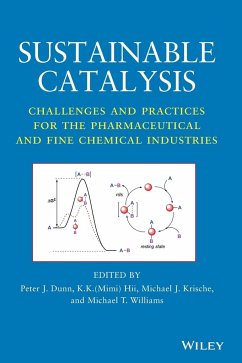Covering key areas that are particularly important for the fine chemical and pharmaceutical industries, this book highlights current challenges and encourages greater research into green organic synthesis and catalytic methodology. It uniquely unites academic and industrial contributors for a balanced treatment of current innovations from academia and case studies from industry practice. For each reaction, a description of the current state-of-art is provided, including the scope and limitations, then illustrated with examples. This offers organic and process chemists an invaluable reference for applying key reactions in sustainable catalysis.
Opens the door to the sustainable production of pharmaceuticals and fine chemicals Driven by both public demand and government regulations, pharmaceutical and fine chemical manufacturers are increasingly seeking to replace stoichiometric reagents used in synthetic transformations with catalytic routes in order to develop greener, safer, and more cost-effective chemical processes. This book supports the discovery, development, and implementation of new catalytic methodologies on a process scale, opening the door to the sustainable production of pharmaceuticals and fine chemicals. Pairing contributions from leading academic and industrial researchers, Sustainable Catalysis focuses on key areas that are particularly important for the fine chemical and pharmaceutical industries, including chemo-, bio-, and organo-catalytic approaches to C-H, C-N, and C-C bond-forming reactions. Chapters include academic overviews of current innovations and industrial case studies at the process scale, providing new insights into green catalytic methodologies from proof-of-concept to their applications in the synthesis of target organic molecules. Sustainable Catalysis provides the foundation needed to develop sustainable green synthetic procedures, with coverage of such emerging topics as: * Catalytic reduction of amides avoiding LiAlH4 or B2H6 * Synthesis of chiral amines using transaminases * Industrial applications of boric acid and boronic acid catalyzed direct amidation reactions * C-H activation of heteroaromatics * Organocatalysis for asymmetric synthesis Offering a balanced perspective on current limitations, challenges, and solutions, Sustainable Catalysis is recommended for synthetic organic chemists seeking to develop new methodologies and for industrial chemists dedicated to large-scale process development.
Opens the door to the sustainable production of pharmaceuticals and fine chemicals Driven by both public demand and government regulations, pharmaceutical and fine chemical manufacturers are increasingly seeking to replace stoichiometric reagents used in synthetic transformations with catalytic routes in order to develop greener, safer, and more cost-effective chemical processes. This book supports the discovery, development, and implementation of new catalytic methodologies on a process scale, opening the door to the sustainable production of pharmaceuticals and fine chemicals. Pairing contributions from leading academic and industrial researchers, Sustainable Catalysis focuses on key areas that are particularly important for the fine chemical and pharmaceutical industries, including chemo-, bio-, and organo-catalytic approaches to C-H, C-N, and C-C bond-forming reactions. Chapters include academic overviews of current innovations and industrial case studies at the process scale, providing new insights into green catalytic methodologies from proof-of-concept to their applications in the synthesis of target organic molecules. Sustainable Catalysis provides the foundation needed to develop sustainable green synthetic procedures, with coverage of such emerging topics as: * Catalytic reduction of amides avoiding LiAlH4 or B2H6 * Synthesis of chiral amines using transaminases * Industrial applications of boric acid and boronic acid catalyzed direct amidation reactions * C-H activation of heteroaromatics * Organocatalysis for asymmetric synthesis Offering a balanced perspective on current limitations, challenges, and solutions, Sustainable Catalysis is recommended for synthetic organic chemists seeking to develop new methodologies and for industrial chemists dedicated to large-scale process development.








